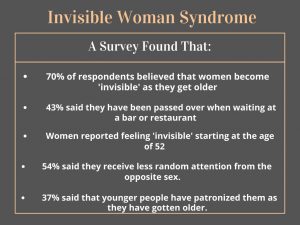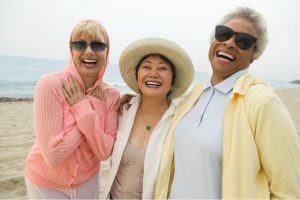It’s Women’s History Month! But for a moment, we want you to take a break from thinking about the collective history of women’s achievements and struggles, and think about your own history. The story of you. An older woman navigating the 2020s, who has experienced not only the changes of history, but the changes to herself that come with aging. How have these changes, well, changed you? Are you more confident in yourself, do you know what you want more than you did when you were younger, are you more ready to speak your mind? We hope so!
But we also know that there can be a darker side to aging when you’re a woman. Not because there’s anything inherently wrong with aging and with your body changing – it happens to everyone! But because of so many messages telling us that women need to stay forever young to stay relevant, or even worthy of being seen and heard. So the question is: despite all of the positive changes that the years have given you, do you sometimes (or even all of the time) feel invisible in a world that values youth so highly? Are you suffering from the invisible woman syndrome? If so, is there a way to feel more seen in a world that seems reluctant to open its eyes?
The Disappearing Act

We get it: everyone gets old, and we’ve just got to deal with it, right? Sure – but what no one signs up for is being made to feel unseen, overlooked, and patronized when they get older. And it seems like that’s just what’s happening to a lot of older women. While middle-aged or older men are often considered to be at the peak of their professional and personal lives, and viewed as accomplished and experienced, women of the same age can be seen as “past it,” especially since they’re often viewed through the lens of their physical appearance.
And we’re not saying that women over 50 don’t look good – that’s a completely subjective thing and hopefully you’re rocking your chosen look – we’re saying that our society is obsessed with youth, and has come to equate that quality with beauty for a woman. That can be a problem not only because it can make older women feel unattractive by default, but also because it reduces them to their physical self, and ignores all their other qualities, experiences, and accomplishments.
And then the disappearing act begins. And it’s not just all in your head: there are real world consequences to aging for a woman. For example, an older actor might no longer be offered roles after she turns 45 (did you know that women were cast as just 26% of characters aged 40 or older in 414 films and television shows aired in 2014 and 2015?). Or a woman can’t land a job interview after her 50th birthday, a 60-year-old woman is ignored in a shop or pushed past on the street, or a widow in her 70s is no longer invited to dinner parties without her husband around.
As the writer Ayelet Waldman once said in an interview after she turned 50, “I have a big personality, and I have a certain level of professional competence, and I’m used to being taken seriously professionally. And suddenly, it’s like I just vanished from the room. And I have to yell so much louder to be seen. … I just want to walk down the street and have someone notice that I exist.”
Feeling Overlooked
If you’re nodding along to all of this, or if you’ve noticed this phenomenon in the life of someone you love, you’re most certainly not alone. Just check out the results of this one survey conducted by the website Gransnet:
- Seven out of 10 (70%) respondents believed that women become ‘invisible’ as they get older, but only a third (32%) thought the same applies to men.
- Women reported feeling ‘invisible’ starting at the age of 52, while for men the average age was 64.
- Nearly two-thirds (64%) felt that older women tend to be more invisible than men of the same age, putting the phenomenon down to society being obsessed with youth (62%), ageist (54%) and sexist (35%).
- Nearly two-fifths (37%) said that younger people have patronized them as they have gotten older. And almost a quarter (23%) said that if they’re out with a younger person, people tend to talk to the younger person rather than to them.
- More than half (54%) said they receive less random attention from the opposite sex. And nearly a fifth (18%) said that people had let doors slam in their faces.
- 43% said they have been passed over when waiting at a bar or restaurant, and 31% said they have been ignored in shops.
Pretty tough stuff, right? And unfortunately, no one can single-handedly change society. But can you change that feeling of invisibility, and feel like you’re actually being seen?
Living Out Loud
If you recognize yourself in the above, you know what we’re not going to tell you? To try to “age gracefully.” The solution to feeling invisible is not to go gently into that good night. And that doesn’t have anything to do with looks and how your body is aging – let’s put all that BS about older women needing to look a certain way or “compete” aside. You can color your hair if you want, or use all the wrinkle creams in the world, that’s your choice – and if it makes you feel good, do it!
The point is that you’re more than wrinkles, or a changing body. In fact, you’re more than someone with “empty-nest syndrome,” or a woman experiencing menopause. You’re someone with, as the writer Francine du Plessix Gray wrote, “presence, authority, and voice.” You just have to find it.
That might not feel easy, but it can be done, and it’s something we all need to do, to avoid withdrawing and ceasing to try (and again, we don’t mean with your looks). According to Alison Carper, a psychologist who practices in New York, “As humans, we all need to be recognized, but as we grow older, the manner of recognition we search for can change.” That means you need to look inside yourself, and make yourself the “subject” of your life, instead of an “object.”
According to Carper, “a subject is someone who is aware of how she can and does have an impact on others and how she is, ultimately, the author of her own life. She is aware of the responsibility this carries.” That’s a lot to take on board, we know. So where do you even start? Most experts agree it’s by taking control, and as the writer Emile Zola put it, “living out loud,” by doing the following:
- Banishing the word “still” – Ok, not in every situation! But we have to stop picking out a few celebrities blessed with great genes and an even better plastic surgeon, and admiringly proclaiming that they “still” have it. Reconnect with your “it”: you never lost it.
- Being where, and doing what, makes you feel like you – Again, you are you, no “still” about it. Go to music festivals if that’s your thing, or run races, or hang out at the nude beach. Paint, play video games, ride your bike, lift weights, write, go to karaoke – whatever you enjoy. Do things just for you.

- Having a velvet-rope policy for who you let into your life – Surround yourself with people who make you feel seen, heard, and respected. There will still be people who treat you as less-than, but you get to decide how you react to them, and if that’s by speaking up, all the better. Two of the positive statistics from the Gransnet survey above were that 65% of the women said that they felt more confident, and 79% said that they care less about what people think about them now that they are older – don’t let that bravado go to waste!
- Forgetting about being “age-appropriate” – Again, we’re not all that interested in talking too much about appearance here, but it is also true that how you present yourself outwardly can reflect how you feel inwardly. So dress how you like to dress, and in what makes you feel most like you (that day), whether it’s ripped jeans casual or full Iris Apfel.
While it can often feel like others are deciding your place in this world for you, especially as you age, that’s your decision. Don’t ever forget that. There’s no need to compete, compare, or apologize. Just be visible for who you are (and forget the people that refuse to see that).
